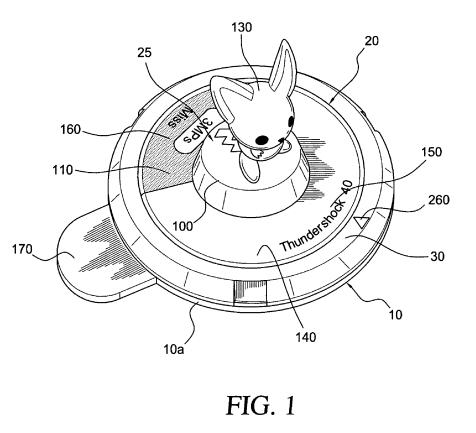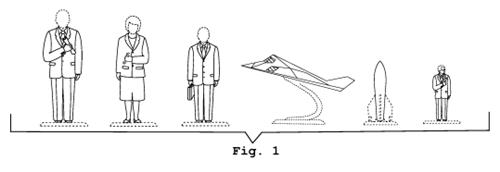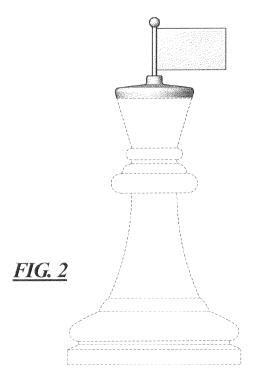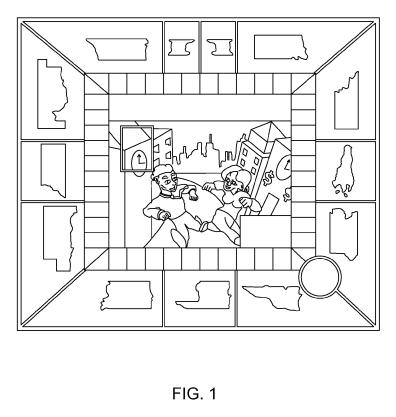Welcome to Purple Pawn, covering games played around the world by billions of people every day.
June Board and Card Game Patents
30 Jun
Posted by Yehuda Berlinger as Card Games, CCGs, Classic Board Games, Electronic Games, Miniatures, Modern Board Games
Land-based, on-line poker system – The idea of a poker game where some of the participants sit around the table and some play in their rooms via WAN. Trivial and obvious. By Maurice Mills.
Method and system for remote gaming – And oh look. In the very same month we get the exact same patent (The idea of a poker game where some of the participants sit around the table and some play in their rooms via WAN) by someone else, this time by Station Casinos.
Games of chance with player-specified elements – Card-based gambling games are too random, because there is more than one random element in the game (i.e. more than one card randomly drawn). This patent provides for a game where players pick all the cards they want, except for the last card.
Wagering games allowing player to wager on iterative simultaneous independent wagers with different variances – Card-based gambling games are not random enough, because there is only one random element at a time (i.e. only one card is drawn at a time). This patent provides for gambling on several cards revealed simultaneously. “The player can, for example, place a bet on whether cards drawn from independent decks will have the same suit, the outcomes of which are entirely independent of each other.”
Method of playing a card game – By Joseph Durbin. A two tier poker game with two payouts.
Method of playing a card game – Also by Joseph Durbin. A three tier poker game with three payouts.
Looking forward to next month’s brilliant patents by Joseph Durbin. Let me guess …
Game piece and method of playing game using same – This:

Which is intended to turn Pokemon collectible cards into a mini game.
Double dead man guts – An elimination poke gamer where the last player has to beat two dealer-played hands.
Chess set – A design patent for a chess set:

Chess game piece – A design patent for a chess piece:

Yup. That’s it.
Political board game – A design patent, including board and cards, from Isake Djavan Valere-Grimes:

Card game allowing redeals – By The Wizard of Odds Consulting aka Michael Shackleford. From the abstract:
A wagering game that allows the player and/or the dealer a redeal. If the player doesn’t like his or her hand, the player can discard the player’s hand and receive a new set of cards. If the dealer doesn’t like his or her hand, according to predetermined dealer criteria, then the dealer can discard the dealer’s hand and receive a new set of cards. The highest hand wins. The player can also have the opportunity to make a bonus bet.
Playing cards for teaching music fundamentals – From Mark Sanderson, music notes playing cards intended to teach music theory. No game included.

Virtual shadow for physical object placed on surface – By HP. This is not a board or card game patent, but it’s going to affect digital representations of board games on surface and tablet computers. Trivial and obvious.
Golf practice game apparatus with sensors – Electronic golf putting game from Richard Whitfield. There are graphics representing a playing card (or die face) above each of the wholes, for some reason.

Method of managing a card game, a computer implementation thereof, and a card game kit – I think this may have something to do with a computer representation of duplicate poker. Unfortunately, it is so vague and broadly written, that it appears to cover all games of poker using a computer and multiple players.
Identity guessing game and methods of playing – By Alana and Eileen Berke. A celebrities game, like many others. Does not include any justification for granting the patent. Cites the game Anybody’s Guess Board Game on BGG as prior art.
Automatic dice shaking method – The patent reads like two stoned dudes playing dice:
Hey dude! Watch this! I put a bowl over some dice and shake it! See?
Cool, dude! You should totally patent that!
That’s how it reads. But actually, what’s doing the shaking is not a stoned dude, but a robotic arm:

Somehow he managed to get a second patent for the exact same device.
2 Comments
Sorry, the comment form is closed at this time.
Trending
- Massdrop.com
- Oh the Irony—Illuminati Card Game Continues to Inspire Conspiracy Theorists
- Footprints, an Educational Ecology Game
- USPS Adds Board Game Flat Rate Box
- Home
- Baila, the Estonian Drinking Card Game
- Crystal Caste Wins Dice Patent Suit Against Hasbro
- Mirror Game, Red and Blue
- Hasbro and Mattel Merger?
- Are Board Games Dangerous?
Archives
Most Popular Articles
- Oh the Irony—Illuminati Card Game Continues to Inspire Conspiracy Theorists
- The 20 Most Valuable Vintage Board Games
- The Truth About Dominoes On Sunday in Alabama
- Sequence Game, and Variants
- USPS Adds Board Game Flat Rate Box
- Baila, the Estonian Drinking Card Game
- The 13 Most Popular Dice Games
- Are Board Games Dangerous?
- Guess Who? The Naked Version
- What Happened to the Jewel Royale Chess Set?
Recent Posts
- Toy Fair 2019—Breaking Games
- Talisman Kingdom Hearts Edition
- Toy Fair 2019—Winning Moves
- Toy Fair 2019—Games Workshop
- Toy Fair 2019—Star Wars Lightsaber Academy
- Toy Fair 2019—Stranger Things Games
- Toy Fair 2019—HABA
- Licensing Roundup
- Game Bandit
- 2018 A Difficult Year For Hasbro But Not For D&D Or MtG
Recent Comments
- on Toy Fair 2019—Winning Moves
- on Game Bandit
- on Second Look—Dungeons & Dragons Waterdeep Dragon Heist
- on Crowdfunding Highlights
- on Beyblade SlingShock
- on Game Bandit
- on Game Bandit
- on Watch This Game!, the Board Game Review Board Game
- on Second Look—Vampire: The Masquerade 5th Edition
- on Palladium Books Loses Robotech IP License, Cancels Five-Year-Overdue Robotech RPG Tactics Kickstarter





[…] This post was mentioned on Twitter by hayden, Joe Joker. Joe Joker said: Game News Across the Board: … of a poker game where some of the participants sit around the table and some… http://bit.ly/abz2fh #poker […]
*rofl*
These are gems we’ll never forget ;)